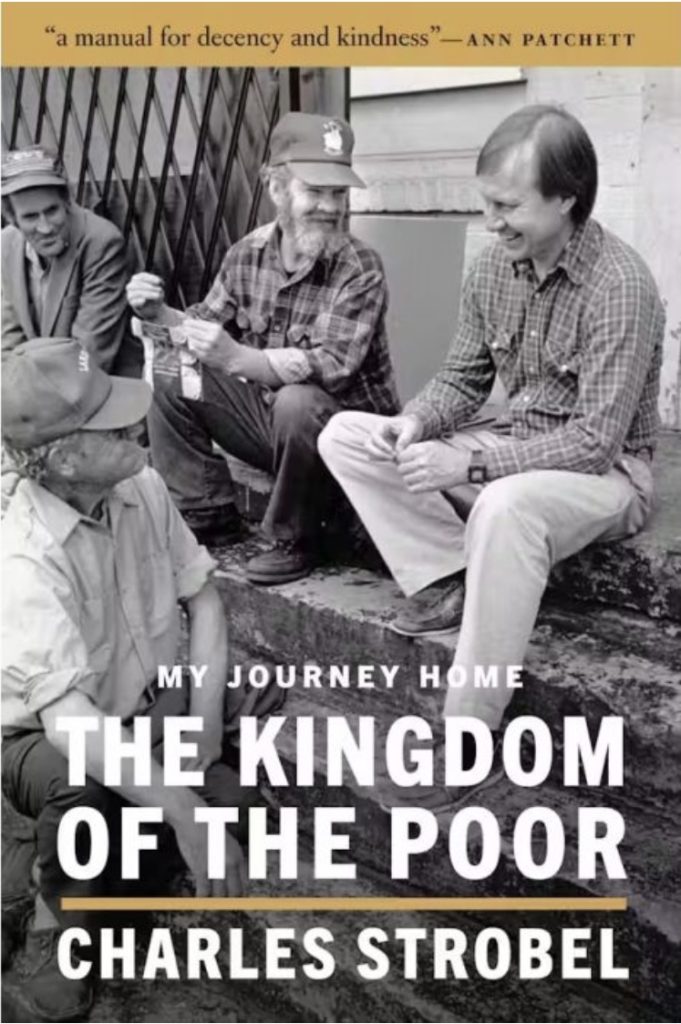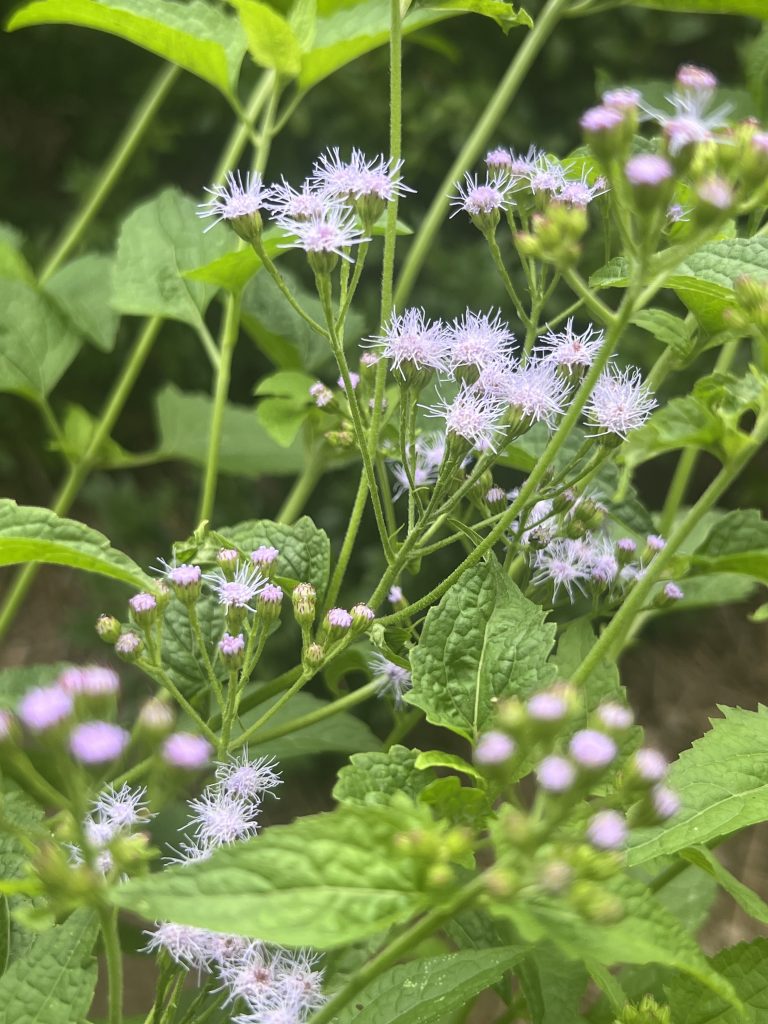If you live in Nashville, you’ve likely heard of Room in the Inn. Charles Strobel, a Catholic priest, began sheltering the homeless in his own East Nashville church in 1985. By the time of his death in 2023, Room in the Inn had grown to include nearly 200 congregations and over 7,000 volunteers serving 1,500 men and women each winter.
Strobel is also well known for his public response to his mother’s kidnapping and murder by a mentally ill prison escapee in 1986. Arguing against the death penalty, Strobel and his family advocated for both lifetime incarceration – and forgiveness.
In his last few years of life, suffering from Parkinson’s and complications from diabetes, Strobel finally did what Ann Patchett had encouraged him to do for years: set pen to paper and reflect on his life.
“They aren’t making new Charlie Strobels,” Ann told him. “When you’re gone, we’re going to need some sort of template to help us figure out how to do the things you’re doing.”
The Kingdom of the Poor: My Journey Home is a humble memoir by an extraordinary man. It’s more a series of snapshots than a work of literary ambition. Each short chapter features a person or group of people who deeply affected his life, beginning with his parents and neighbors in the North Nashville neighborhood where he grew up and including his dog Lulabelle, radio announcer Larry Munson, and Martin Luther King Jr. There’s a sweetness in these pages; a sense of gratitude; a sense of the community he grew up in, and the one he helped create.
This book is memoir – as it promises – but it’s also a little bit philosophy, a little bit sermon, a little bit exhortation to do better and be better. Strobel is convinced that we are called to care for each other, and he is convincing.
I’d love to share one passage with you, from a chapter called “The Man in the Morgue”…
Once, during the years when I was the pastor at Holy Name, the telephone rang in the middle of the night. I was dead asleep and fumbled around to answer it. I remember checking my clock. It was around 3 a.m., never a good sign.
I answered, “Hello, hello?”
A voice on the other end asked, “Are you a priest?”
I said, “Yes, I am. How can I help you?”
The voice said, “I want to kill myself.”
Suddenly, I was wide awake, as charged as a bolt of lightning. I asked, “Where are you?”
The voice said, “I’m at Mapco.”
I said, “You’re not far from here. Can you come over?”
“Yes,” the voice said.
I responded, “I’m putting on some coffee. Come on over and we’ll talk. I’ll have coffee ready for you when you get here.”
The voice said, “I’ll be there.”
I went downstairs. I made a pot of coffee and waited to see if the voice would make an appearance.
Soon I heard the doorbell. I opened the door and saw a man. I didn’t recognize him. He was a stranger. He was very ordinary looking – a white man of medium build with dark hair, probably in his forties. We went to the kitchen and sat down to drink some coffee and talk.
I told him my name. He did not tell me his.
I said, “How can I help you?”
He said, “I don’t want to live anymore.”
In the back of my mind, I remembered conversations from my years in seminary about how to help someone in distress. We were taught to ask a series of questions to encourage the person to talk about something important in their life…
I said, “Please tell me what is going on.” He said nothing.
I asked, “Are you married?”
“No.”
“Do you have any children?”
“No.”
“Do you have parents?”
”No.”
“Do you have a brother or sister?”
“No.”
“A cousin, aunt, or uncle?”
“No.”
“Do you have any family at all?”
“No.”
“Do you have friends?”
“No.”
“Do you have any plans?”
“No.”
“Do you have any money?”
“No.”
“Do you have a place to live?”
“No.”
Each time the answer came back negative. He had no relationships, no support, no plans. Repeatedly, he offered nothing but a one-word response to my questions: no. I seemed close to exhausting the questions that might lead him to some desire to live.
Then I asked, “Tell me, are you working?
He said, “No, I lost my job.”
“Where did you work?”
”I worked at the morgue.”
I said, “Tell me what that means. What exactly did you do?”
He began to speak as if he was still working there. He described hosing down metal tables and cleaning up after bodies were brought in and autopsied. He said “The morgue is a gruesome place. When doctors come to the morgue, they sometimes make light of the experience. But I try to keep it as clean as I possibly can.”
I asked, “How do you do that?”
He said, “I try to treat each piece with the utmost respect.”
I repeated what he said as a question: “You try to treat each piece of flesh with the utmost respect?”
”Yes.” That’s all he said.
There was silence. I was stunned. I couldn’t believe what I’d just heard. This man had nothing at all. Yet, he was able to articulate the meaning of life as he saw it.
All my questions were useless. There was nothing I could say to him that was more powerful than what he said to me. “I try to treat each piece with the utmost respect.”
I said, “I don’t know your name. When you leave here tonight, I don’t know where you’re going. But let me tell you – what you’ve said is something I’ll never forget.
I don’t know what you’re going to do tomorrow. I would like for you to come back so we can talk some more. But whatever happens and whatever you do, I’ll never forget you as long as I live.
I want you to know how good you are. Do you realize how good you are?”
He said not a word. I had nothing left to say.
I couldn’t give him the help he was seeking. Yet he gave me a message I needed to hear. He tried to treat the least of what God has made, lifeless flesh, with the utmost respect.
With that, we exchanged a few pleasantries. I wanted him to stay. I told him he was loved.
I remember thinking that I always wanted to know my father better – my father whose eyes I saw wide open as he lay on a bed in a mortuary when I was only four years old. My father, whose eyes my Aunt Mary walked over and closed so tenderly, treating him with the utmost respect.
I remember thinking that I wanted to know the Man in the Morgue better. But he was ready to go. He stood up, I showed him to the door. He left, and I never saw or heard from him again.
I never forgot him.
What a gift to be the one who treats everything God has made with the utmost respect, without exception. That’s what the world is missing.
* * *





Outstanding
Xoxo
I adored Charlie…when my grands were young we would go at Christmas and sing and play Carols. we and he loved that. What a man.
Oh Carole, I love that you knew him! I bet he adored you too! Xoxo
Charlie’s mind and spirit were open to whatever the man had to say, and he was given a gift he might otherwise have missed. I’m going to watch and listen for gifts today, spoken and unspoken.
Me too, Beth – xoxo
Jennifer, I had the delightful surprise of being joined by Beth at FPC’s 8:30 service. We were both so moved by the extraordinary offertory, Benedictus from The Armed Man, a Mass for Peace. There was cello music accompanying, and it felt as though heaven itself was opening pulling us close to the angels to sing and see God’s glory. And then I read this beautiful entry about Charles Strobel. Ryan often says that we live in the already but the not yet. Heaven feels so close today. Thank you.
I had the pleasure of singing with Beth at the 11:00! How lucky you and I both were to have time with her today! I love the way Ryan puts it, “the already but the not yet.” It is a wonder when we can feel Heaven close by. Xoxo
Absolutely beautiful!
Xoxo
Thank you for sharing The Kingdom of the Poor. Fr. Strobel blesses the readers. It’s a deeply moving and, at times, hilarious book.
Thank you for being in touch, Jeanne! I agree with you… he does bless the reader. And yes it is both moving and funny! Xoxo
Jennifer, I don’t know you personally but only thru the books you write about. Because of them, I think you should give “Theo of Golden” a try. The world needs more people like Charlie and Theo in it.
Several people have mentioned it to me lately, Laura! I will revisit Theo of Golden… xoxo
I had tears in my eyes at the end of the story. Thank you, Jennifer.
Peace, LaMon
I felt moved and unsettled by the story. It sounds like you did as well LaMon. I am always glad to hear from you. Xoxo
Many thanks for this gift, this morning, Jennifer. And yes, absolutely YES to Theo of Golden. Someone suggested this to Minna Gioia, who passed it on to Brad, who gave it to me. Self published, I think, by Adam Levi, a retired lawyer and judge. Sadness and joy, great humanity, fascinating characters, a super plot, and gorgeous prose reminiscent of Amor Towles. Am midway through the second read.
Well you have sealed the deal, John! Theo of Golden is my next read! My book club is discussing Jamie Quatro’s Two Step Devil tonight… I am ready for a new book… xoxo
Thank you for sharing this. It is beautiful.
The Man in the Morgue is such a strange and beautiful story… xoxo
Thank you, Jennifer, for another excellent post and book recommendation about one of Nashville’s most gracious influencers.
I wish I had known him! Xoxo
Jennifer, thank you for telling me about Charles Strobel. What an extraordinary man he was.
A life well lived. I am always in need of the inspiration… xoxo
powerful!
xoxo
Thank you for this post,Jennifer, and for sharing the passage, and Charles Strobel’s reflection which brought his experience to an essence of profound simplicity and power. I saw him as Jesus, and was reminded that we too have this power to connect in deep respectful ways.
Your photos are beautiful. You have once again provided me with a gift to begin my day.
Blessings to all.
I also appreciated everyone’s comments. Many thanks.
And blessings to you, Paulette… xoxo
This is one of my favorite books of this decade. I have gifted it to many people. It’s been motivating to me and others I know who were not fortunate to know him in life.
It is a spirited book! I can see why you would love it so much. It’s a book that makes you feel that anything is possible. Xoxo
A wonderful gentleman I was privileged to know, and a beautiful story on this Sunday. Thank you, Jennifer.
I love that you knew him, Don! I’m sure he was so glad to know you too.So nice to hear from you! Xoxo
Very moving story. I’m going to look up the book. Also, I have given Theo of Golden to many friends. What a special book.
Xoxo